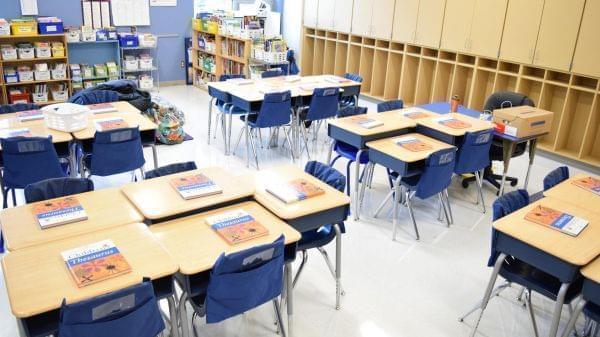Bill Links Private School Tax Break To Public School Funding

A new bill in the Illinois legislature would link funding for private school scholarships to new funding for public schools. Carter Staley/NPR Illinois
Illinois’ new school funding plan — approved in August and hailed as a historic change — relies on the legislature to give every school the same state aid it got last year, plus push another $350 million through a new formula. That $350 million is crucial because it’s the part designed to address the inequity that has plagued Illinois schools for decades.
State Sen. Jennifer Bertino-Tarrant, a Democrat from Shorewood, wants to make sure lawmakers don't skip that step.
She filed a measure today tying it to a tax break for people who provide private school scholarships.
The tax break was added to the school funding bill in the 11th hour, by negotiators working to craft a compromise plan that Gov. Bruce Rauner would sign.
Rauner takes pride in the fact that he has boosted state aid to public schools. He vetoed the original school funding bill, saying it gave too much money to Chicago Public Schools, but then chose a Chicago Public School as the site of his bill-signing celebration.
Since the General Assembly has a history of “pro-rating” school funding, Bertino-Tarrant wanted to find a way to hold lawmakers to their $350 million promise to public schools. Her legislation would nix those private school tax credits any fiscal year the General Assembly fails to appropriate full funding for public schools.
"It allows the tax credits to still occur, so we're not taking away any of the substance. It's just requiring us to prioritize public education as the state of Illinois should be doing," she says. "When we begin to create a budget, if there is legislation that says we have to put the minimum funding in there before we give these tax credits, it may give more initiative to make sure the minimum is there."
She says Democrats advocated for this clause while school funding was being negotiated. They decided not to oppose the compromise bill, but just tie up loose ends, like this one, after it became law.
Links
- Despite New Funding Formula, Some Schools Lose
- Governor Signs School Funding Reform Bill
- State Senators Discuss School Funding Bill; Jaggery; Baby Pigs And The Microbiome
- Area School Superintendents Relieved School Funding Bill Passes
- How Much Credit Should Rauner Get For School Funding?
- Education Professor Calls The New Funding Overhaul Bill A ‘Win’ For Illinois Children
- School Funding Bill Passes State Senate, Moves To Governor’s Desk
- Illinois House Passes School Funding Overhaul On 2nd Attempt
- Legislative Leaders Inch Toward School Funding Deal
